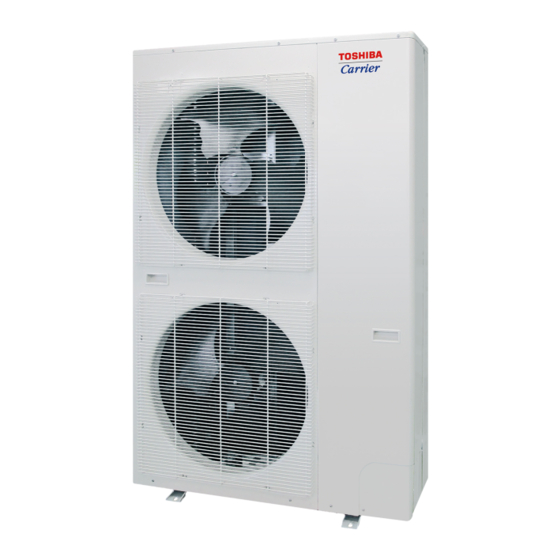Toshiba Carrier MCY-MAP0607HS-UL Installation Manual - Page 13
Browse online or download pdf Installation Manual for Air Conditioner Toshiba Carrier MCY-MAP0607HS-UL. Toshiba Carrier MCY-MAP0607HS-UL 30 pages. Outdoor unit

Air purge
NOTE
For the air purge at installation time (discharge of air in the connecting pipes), use the "Vacuum pump method".
• For protection of the earth's environment, do not discharge the refrigerant gas into the air.
• Eliminate the remaining air (nitrogen gas, etc.) in the unit with a vacuum pump.
If gas remains, performance and reliability of the unit may be reduced.
After the airtight test, discharge the nitrogen gas. Then connect the gauge manifold to the service ports at the gas side
and liquid side, and connect the vacuum pump as shown in the following figure.
Perform vacuuming for gas side and liquid side.
• Perform the vacuuming method from both the liquid and gas sides.
• Use a vacuum pump with the counter-flow preventive function so that oil in the pump does not back up in the air
conditioner pipe when the pump has been stopped. (If oil in the vacuum pump enters into the air conditioner with
R410A refrigerant, a problem may occur in the refrigeration cycle.)
Connected to indoor unit
Ball valve fully closed
Main pipe
(Gas side)
Flare connection
Flare connection
• Use a vacuum pump that has a high vacuum (below -14.6 psi) and a large exhaust gas amount (over 40 L /minute).
• Perform vacuuming for 2 or 3 hours (time differs due to pipe length).
In this time, check all valves at the liquid and gas sides are fully closed.
• If the vacuuming valve amount is not decreased to below -14.6 psi even after vacuuming for 2 hours or more,
continue vacuuming for 1 hour or more.
If -14.6 psi or less cannot be obtained by 3 hours or more of vacuuming, detect and repair the leak.
• When the vacuuming valve has reached -14.6 psi or less after vacuuming for 2 hours or more, close valves VL and
VH on the gauge manifold fully. Stop the vacuum pump, leave it as it is for 1 hour and then check that the vacuum
does not change. If it does change, then there may be a leak within the system.
• After the above procedure for vacuuming has finished, exchange the vacuum pump with a refrigerant cylinder and
advance to the additional charging of refrigerant.
EN-23
Low pressure
High pressure
gauge
gauge
Gauge
manifold
Outdoor unit
Service port
Service port
Packed valve fully closed
Vacuum pump
(Liquid side)
Adding refrigerant
After vacuuming is complete, exchange the vacuum pump with a refrigerant canister and start the additional charging of
refrigerant.
Calculation of additional refrigerant charge amount
The default refrigerant amount does not include the refrigerant for pipes at the local site.
For refrigerant to be charged in pipes at the local site, calculate the amount and charge it additionally.
Outdoor unit type
MAP0367
Charging amount (lbs (kg))
Additional
Real length of liquid
refrigerant charge
=
pipe
amount at local site
Table 1
Liquid pipe dia. (in)
Additional refrigerant amount /
1 ft liquid pipe (lbs/ft)
Table 2
Outdoor unit type
Compensation by outdoor capacity (lbs (kg))
Example: (060 type)
L1
L4
L1
Ø3/8": 32.8 ft
L2
L5
Ø1/4": 9.8 ft
L6
Additional charge amount R (kg)
Lx: Real total length of liquid pipe diameter
Ly: Real total length of liquid pipe diameter
= {( Lx × 0.017 lbs/ft ) + ( Ly × 0.038 lbs/ft )} × 1.2 + ( 1.76 lbs )
= {( 39.3 × 0.017 lbs ) + ( 91.8 × 0.038 lbs )} × 1.2 + ( 1.76 lbs )
= 6.75 lbs
– 12 –
MAP0487
MAP0607
14.8 (6.7)
14.8 (6.7)
14.8 (6.7)
Additional refrigerant
Compensation by
charge amount per
×
×
1.2
+
outdoor HP
1 ft liquid pipe
(Table 2)
(Table 1)
Ø1/4"
Ø3/8"
0.017
0.038
MAP0367
MAP0487
0 (0)
0.88 (0.4)
L3
L2
L6
L5
A
B
C
Ø3/8": 32.8 ft
L3
Ø3/8": 16.4 ft
Ø1/4": 13.1 ft
L7
Ø1/4": 16.4 ft
(ft)
1/4"
(ft)
3/8"
Installation Manual
MAP0607
1.76 (0.8)
L7
D
L4
Ø3/8": 9.8 ft
EN-24
